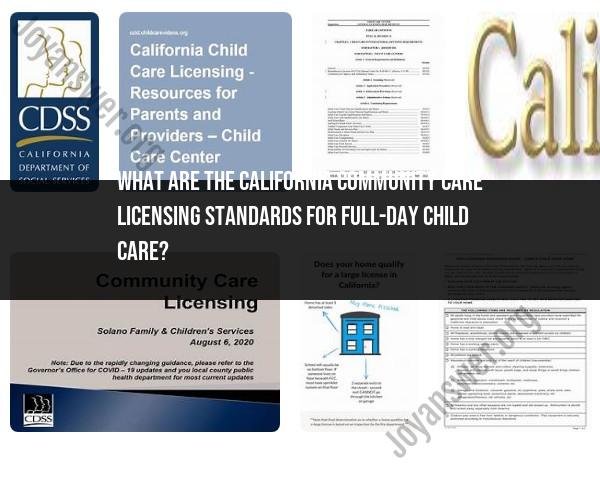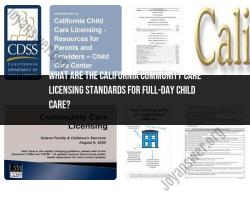What are the California Community Care Licensing Standards for full-day child care?
The California Community Care Licensing (CCL) Division, under the California Department of Social Services (CDSS), sets and enforces licensing standards for various child care programs, including full-day child care facilities. These standards are designed to ensure the safety, well-being, and development of children in these settings. The specific licensing standards may vary depending on the type of child care facility, but here are some common requirements for full-day child care in California:
Staffing Requirements:
- Adequate staff-to-child ratios, which may vary depending on the age of the children.
- Background checks, fingerprinting, and clearance for all staff and volunteers.
- Minimum age and education requirements for staff and directors.
- Mandatory training in CPR and first aid for staff.
Health and Safety:
- Safe and clean indoor and outdoor environments.
- Regular safety inspections.
- Measures to prevent accidents and injuries.
- Safe storage of hazardous materials.
- Emergency and disaster plans.
Physical Environment:
- Sufficient indoor and outdoor space to accommodate the number of children.
- Proper lighting, ventilation, heating, and cooling.
- Childproofing to prevent accidents.
- Sanitary facilities and handwashing stations.
- Clean and safe play equipment and materials.
Nutrition:
- Nutritious and age-appropriate meals and snacks.
- Adequate water and hydration.
- Compliance with dietary guidelines and meal planning.
Educational Programs:
- Age-appropriate curricula and activities that promote children's learning and development.
- A variety of learning materials and resources.
- Observation and assessment of children's progress.
Licensing Records and Documentation:
- Accurate and complete child and staff records.
- Licensing documentation, policies, and procedures.
- Reporting of any incidents, injuries, or accidents.
Parental Involvement:
- Open communication with parents or guardians.
- Sharing of information about the child's care, including daily reports.
- Encouraging parental involvement and feedback.
Regulations for Different Types of Facilities:
- Different types of child care facilities (e.g., family child care homes, child care centers, preschools) may have specific licensing requirements tailored to their operational models.
Compliance with Title 22 Regulations:
- Child care facilities in California must adhere to the Title 22 regulations, which outline licensing standards in detail.
Please note that licensing standards and regulations may be subject to change, and it's essential to consult the most recent information from the California Department of Social Services (CDSS) and the California Community Care Licensing Division for the most up-to-date and specific requirements for full-day child care facilities in the state. You can find detailed information on their website or contact them directly for guidance.
California Community Care Licensing Standards for Full-Day Child Care
The California Department of Social Services (CDSS) sets comprehensive licensing standards for full-day child care providers to ensure the safety and well-being of children in their care. These standards cover various aspects of child care operations, including:
Staff qualifications: Child care providers must have appropriate training and experience to meet the developmental needs of children.
Ratios and group sizes: The number of children per caregiver is regulated based on the age of the children, ensuring adequate supervision and individualized attention.
Health and safety: Child care facilities must adhere to strict health and safety protocols, including regular cleaning, sanitation, and accident prevention measures.
Nutrition: Providers must provide nutritious and balanced meals and snacks that meet children's dietary needs.
Learning environment: Child care programs must provide stimulating and age-appropriate activities that promote children's cognitive, social, and emotional development.
Licensing Requirements for Child Care Providers in California
To operate a licensed full-day child care facility in California, providers must meet specific requirements, including:
Obtain a license: Apply for a child care license through the CDSS, meeting all licensing standards and undergoing inspections.
Background checks: All staff members must undergo thorough background checks to ensure their suitability for working with children.
Training and certifications: Providers must complete required training courses, such as CPR and first aid, and maintain current certifications.
Maintain records: Accurate and up-to-date records of children's attendance, health information, and emergency contacts must be maintained.
Ensuring Safe and Quality Child Care Services
Beyond meeting licensing requirements, child care providers should prioritize safety and quality by:
Creating a safe environment: Regularly inspect facilities for potential hazards, ensure proper supervision, and implement safety protocols.
Nurturing relationships: Build positive relationships with children, fostering trust, communication, and emotional support.
Engaging activities: Provide a variety of stimulating activities that promote learning, creativity, and social interaction.
Open communication: Maintain open communication with parents, addressing concerns, sharing updates, and collaborating on children's development.
Compliance and Inspections: Navigating Licensing Standards
Child care providers must remain compliant with licensing standards and prepare for inspections by:
Regular self-assessment: Regularly review licensing standards and assess their compliance, identifying areas for improvement.
Maintain documentation: Keep accurate records of staff qualifications, training, health and safety protocols, and incident reports.
Prepare for inspections: Cooperate with licensing inspectors, providing access to facilities and documentation, and addressing any concerns promptly.
Resources for Child Care Providers in California
California offers various resources to support child care providers in meeting licensing requirements and providing quality care:
California Department of Social Services (CDSS): Provides licensing information, training resources, and regulatory updates.
Child Care Resource and Referral (CCR&R) Agencies: Offer local support, training opportunities, and guidance on licensing and compliance.
California Child Care Resource and Referral Network (CCCRRN): Provides a comprehensive directory of CCR&R agencies and additional resources for providers.
By adhering to licensing standards, prioritizing safety and quality, and utilizing available resources, child care providers can create nurturing environments that promote children's well-being and development.


